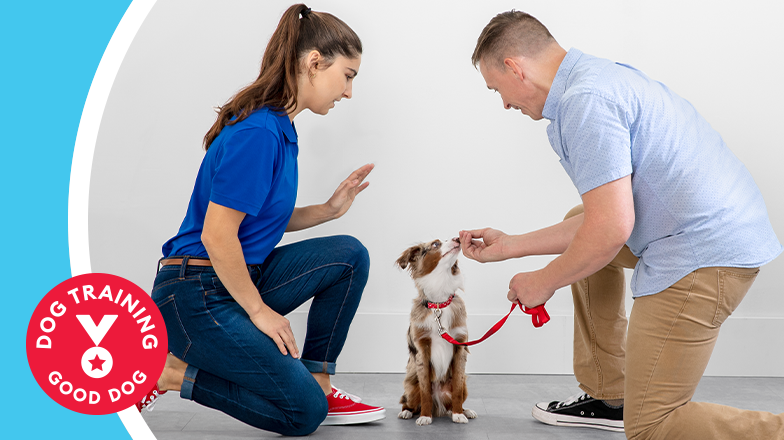Dog Training Near Me: Understanding Canine Behavior Like a Pro
Wiki Article
Efficient Techniques for Successful Dog Training: A Comprehensive Overview
Effective canine training calls for a nuanced understanding of canine behavior. It depends upon the principles of positive reinforcement and consistency. Fitness instructors need to recognize the importance of crucial commands and socializing. Addressing usual behavior issues can change a dog's personality. As the bond in between proprietor and canine strengthens, the method they interact develops. The journey of effective training includes various methods that may stun also experienced animal owners. What are the vital aspects that can make a considerable difference?Understanding Canine Actions
Comprehending canine habits is necessary for efficient canine training, as it permits fitness instructors to translate a dog's actions and reactions in numerous circumstances. Canines connect largely with body language, articulations, and faces. Recognizing indications of worry, stress, or aggressiveness can assist instructors change their methods to assure a positive training experience. For instance, a wagging tail does not always suggest happiness; the context and various other body signs should be taken into consideration.Furthermore, comprehending a dog's breed-specific attributes can provide understandings into their behavior patterns and impulses. Socializing plays a critical role in forming a pet's reactions to brand-new individuals and environments. Observing a canine's play design can additionally expose their character and convenience degrees. By thoroughly assessing these habits, trainers can produce tailored methods that cultivate knowing and enhance the bond in between dog and proprietor, ultimately bring about more effective training outcomes.
The Significance of Favorable Support
Positive support is an essential method in pet training that enhances the discovering process by satisfying wanted actions. This method encourages canines to duplicate activities that generate favorable results, such as deals with, praise, or playtime (Dog Training Near Me). By associating etiquette with rewards, canines become more motivated and engaged during training sessions
Integrating favorable support right into training routines can lead to quicker learning and better retention of commands. It promotes a joyful ambience that enhances both the dog's experience and the trainer's fulfillment, making it a basic element of efficient canine training.
Crucial Commands Every Pet Need To Know

Producing a Regular Training Arrange
Developing a constant training schedule is crucial for efficient pet dog training, as it aids strengthen discovering and produces a sense of regular for the canine. A structured approach permits both the instructor and the canine to anticipate training sessions, which can boost focus and engagement. Preferably, training sessions ought to be brief, long-term in between 5 to 15 minutes, to keep the canine's attention and interest.Incorporating training into daily tasks, such as nourishment or strolls, can additionally promote uniformity. This combination aids canines connect training with positive experiences. It is essential for fitness instructors to remain versatile; unexpected occasions might necessitate changes to the schedule.
In addition, rep is crucial. Regular method of actions and commands solidifies understanding and builds confidence. By sticking to a constant timetable, fitness instructors can assure that their pets develop great habits and respond dependably to commands, laying the foundation for reliable training outcomes.
Socialization: Secret to a Well-Adjusted Pet dog
Socializing is vital for a canine's advancement, affecting their habits and interactions with individuals and various other pets. Very early exposure to various atmospheres, appears, and experiences can significantly boost a pet's versatility and self-confidence. Using effective socialization techniques can help assure a well-adjusted canine companion.Value of Very Early Socializing

Methods for Efficient Socialization
While lots of pet dog proprietors acknowledge the value of socialization, understanding efficient strategies to facilitate this process is essential for fostering a well-adjusted family pet. Steady direct exposure to varied atmospheres, people, and other animals can greatly enhance a dog's convenience degree in different circumstances. Positive support plays an essential role; rewarding desired actions encourages canines to approach brand-new experiences with confidence. Structured playdates with genteel canines help develop social abilities and mitigate fear responses. Enrolling in obedience classes can also give regulated environments for socialization. Finally, keeping a calm attitude as a proprietor strengthens the pet's complacency, enabling more effective interactions. These strategies jointly add to a balanced and versatile canine friend.Managing Common Behavioral Issues
Dealing with usual behavior issues is important for keeping a harmonious partnership between dogs and their owners. Secret obstacles such as aggressiveness, extreme barking, and jumping habits call for targeted methods to handle properly. Understanding the origin of these habits can bring about effective treatments and an extra well balanced canine friend.
Addressing Aggression Issues
Aggression in canines can materialize in various types, positioning challenges for instructors and proprietors alike. Resolving these problems demands a comprehensive understanding of the underlying causes, which may include territoriality, worry, or resource securing. Recognizing triggers is essential; owners ought to observe their pet dog's body language and behaviors to determine details scenarios that prompt aggressiveness. Favorable reinforcement strategies can effectively change hostile habits, fulfilling calm feedbacks to determined triggers. Consistency is vital, and proprietors should remain person throughout the training process. In some cases, specialist support from a certified pet dog instructor or behaviorist may be required, particularly for serious aggression. Inevitably, the goal is to develop a secure atmosphere for both the dog and those around it.Taking Care Of Too Much Barking
Extreme barking can be a significant hassle for pet proprietors and neighbors alike, typically signaling underlying concerns that need addressing. Determining the triggers behind the barking is crucial; these might consist of monotony, stress and anxiety, or a response to external stimulations. Owners ought to observe their pet's behavior and atmosphere to pinpoint the cause. Dog Training Near Me. Applying constant training techniques, such as favorable support, can effectively minimize barking. Teaching commands like "peaceful" or rerouting the pet's interest presently of barking can be beneficial. Furthermore, giving adequate physical and psychological excitement via exercises and interactive toys can alleviate boredom-related barking. In many cases, consulting a specialist instructor or behaviorist may be required to establish tailored methods that resolve persistent barking issuesDecreasing Leaping Actions
Many dogs exhibit jumping habits, frequently as a method of sharing excitement or seeking attention from their owners and visitors. This habits can be anonymous problematic, specifically when it results in unintended injuries or pain for visitors. To minimize jumping, owners need to first stay tranquil and stay clear of awarding the actions with attention, as this can strengthen it. Instead, they can teach a different habits, such as resting, by awarding the dog for remaining calm when somebody approaches. Uniformity is vital; all household participants have to apply the exact same guidelines. Furthermore, training sessions must include distractions to assist the canine discover to control their impulses. In time, with persistence and determination, jumping can be greatly minimized, bring about an extra pleasant environment.Building a Solid Bond Through Training
Educating a dog commonly focuses on commands and behaviors, it also offers as a vital chance to strengthen the bond between the pet dog and its owner. Involving in training sessions promotes communication, common understanding, and depend on. When proprietors invest time in instructing their canines, they show commitment, which helps the pet dog really feel safe and secure and valued. Favorable support techniques, such as deals with and praise, not only encourage preferred habits however likewise enhance the psychological connection in between the pet and proprietor.Consistency in training builds a sense of reliability, permitting pets to comprehend their find here role within the home. Each successful command enhances the pet's confidence, leading to a much deeper relationship. Normal training sessions can come to be pleasurable bonding experiences, loaded with playfulness and interaction - Dog Training Near Me. Ultimately, the procedure of training goes beyond plain obedience, producing a collaboration that improves the lives of both the pet dog and its owner
Often Asked Concerns
What Age Is Best to Beginning Training a Young Puppy?
The very best age to begin educating a pup is typically between 8 to 12 weeks. At this phase, young puppies are most responsive to discovering, making it a perfect time for fundamental training and socialization.
The length of time Should Each Educating Session Last?
The suitable period for each and every pet dog training session normally ranges from 5 to 15 minutes, depending upon the dog's age and focus span. Short, focused sessions boost discovering and retention, making training more pleasurable and efficient.Can Older Pets Still Be Trained Effectively?
Older canines can without a doubt be trained effectively. With persistence and constant methods, they can learn brand-new commands and behaviors. Their experience typically makes them more responsive to training, enhancing the bond in between pet dog and proprietor.What Tools Do I Need for Training?
For reliable pet training, essential equipment includes a sturdy chain, a comfortable harness, high-value treats, training clickers, and a selection of playthings. These devices promote communication and enhance positive habits during training sessions.Exactly how Do I Track My Canine's Training Progression?
To track a pet dog's training development, one can maintain a journal, record turning points, and note behavior modifications. Routine analyses, including timed commands and obedience examinations, aid assess improvement and identify locations requiring more focus.Understanding canine behavior is necessary for effective canine training, as it permits fitness instructors to analyze a pet's activities and reactions in numerous circumstances. Establishing a regular training routine is vital for effective pet training, as it assists enhance learning and produces a feeling of regular for the pet. Training a canine commonly focuses on behaviors and commands, it also serves as an essential opportunity to strengthen the bond between the pet and its owner. When owners spend time in teaching their pet dogs, they show commitment, which helps the pet really feel secure and valued. The suitable period for each canine training session commonly company website varies from 5 to 15 mins, depending on the pet's age and attention period.
Report this wiki page